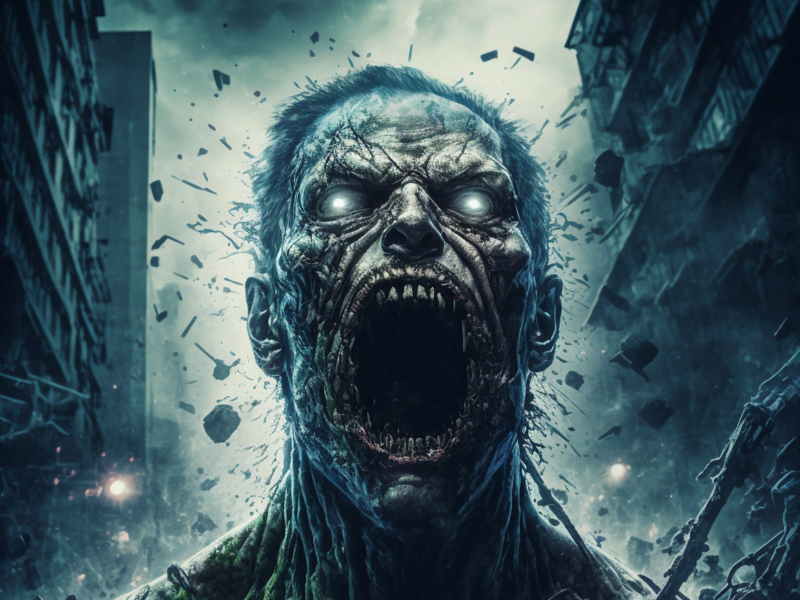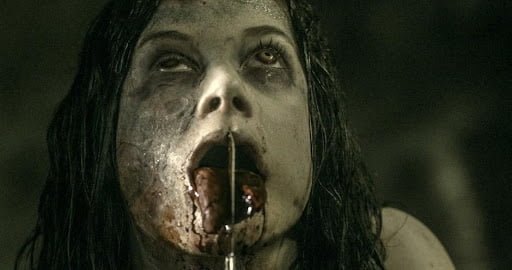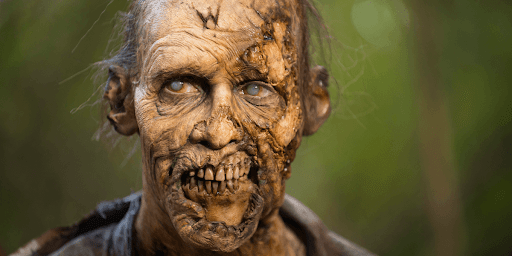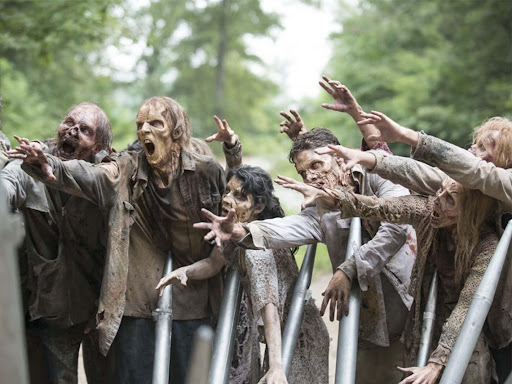Zombies, popularized by numerous movies, books, and TV shows, have long fascinated and terrified audiences. One question always comes up, do zombies feel pain?
Zombies cannot feel pain due to their reanimated and deteriorated state. Their lack of sensory perception and diminished neurological functions contribute to this portrayal.
Lets find out the science and feelings of the undead.
The Science Behind Zombie Pain. Do They Feel It?
The Anatomy of Zombies To understand zombie pain, we must first examine their unique anatomy. Zombies, typically depicted as reanimated corpses, possess drastically altered physiology compared to living organisms. Though functioning to some extent, their brains lack higher cognitive functions, including the capacity for complex emotions and self-awareness. Consequently, it is plausible to assume that their pain perception is severely diminished.
Neurological Impairment The central nervous system, responsible for transmitting pain signals, undergoes substantial deterioration in zombies. Decay and necrosis compromise neural pathways, disrupting the transmission of sensory information. While basic reflexes may remain intact, the intricate network necessary for pain processing and interpretation is likely compromised. As a result, zombies may not perceive pain in the same manner as living beings.
Endorphin Release and Pain Suppression: Furthermore, zombies exhibit abnormal hormonal activity. Endorphins, the body’s natural painkillers, are released during periods of distress or injury in living organisms. These endogenous opioids dampen pain signals, acting as a form of self-regulation. However, in the case of zombies, the dysregulated endocrine system may cause an excessive release of endorphins. This flood of pain-suppressing chemicals could effectively mask any discomfort zombies might experience, rendering them seemingly impervious to pain.
Diminished Cognitive Processing: Zombies’ reduced cognitive processing capacity is another crucial aspect. Pain, as experienced by humans, involves not only the perception of physical discomfort but also an emotional and mental response. The ability to interpret pain, assess its significance, and take appropriate action is integral to survival. Given the cognitive Impairment exhibited by zombies, their capacity for emotional and mental pain processing is likely severely compromised.
The Emotional Side of Zombies. Can They Experience Pain and Suffering?
Can zombies experience pain and suffering on an emotional level? While the concept of zombies feeling pain varies across different fictional universes, exploring the emotional side of these creatures can shed light on their capacity for suffering. Although zombies exhibit cognitive impairments and lack complex emotions, it is worth considering whether remnants of their former human selves might still be present, enabling them to experience some form of emotional distress.
If we think of zombies as once alive, it is reasonable to assume that certain remnants of their emotional capacity might persist, albeit greatly diminished. While their brains may have deteriorated, leading to a loss of higher cognitive functions, the primary emotional responses associated with pain and suffering could linger.
Zombies might still respond to external stimuli, such as physical harm or threats, with primitive emotional reactions, although significantly dulled compared to their human counterparts. This suggests that while zombies might not experience pain and suffering as profoundly and nuanced as living beings, they may possess a vestigial capacity for limited emotional responses. The diminished nature of their emotional experiences could be attributed to the deterioration of neural pathways associated with higher emotional processing and the lack of complex thought processes required for introspection and self-awareness.
Factors such as the dysregulation of neurotransmitters and hormones in zombies’ decaying bodies might further contribute to their altered emotional states. Overall, whether zombies can experience pain and suffering on an emotional level is complex, with no definitive answer. While there are compelling arguments for residual emotional experiences, they would likely be drastically diminished and differ significantly from the depth and complexity of human emotional experiences. Nevertheless, exploring the emotional side of zombies adds an intriguing layer to their portrayal in fictional works, allowing us to contemplate the potential remnants of humanity lurking within these terrifying creatures.

The Ethics of Killing Zombies. Should We Consider Their Pain?
In the world of zombie fiction, the living often faces hordes of the undead, compelled to defend themselves and society against these relentless creatures. However, amidst the chaos and survival instincts, a moral dilemma emerges, Should we consider the pain and suffering of zombies when making decisions about killing them?
While zombies are typically portrayed as mindless and devoid of emotions, a closer examination prompts us to contemplate the ethical implications of ending their existence. On the one hand, zombies threaten human life, driven by an insatiable hunger for flesh. They lack higher cognitive functions, rendering them incapable of experiencing pain and suffering in the same way as living beings.
From this perspective, the immediate focus should be self-preservation and protecting the remaining survivors. However, if we consider the possibility that fragments of their humanity might persist, a more nuanced ethical question arises. Is ignoring their potential pain and suffering morally justifiable if zombies possess even a fraction of their former human selves? Even though their cognitive abilities are impaired, it is conceivable that zombies still experience a limited range of emotions, albeit on a vastly diminished scale.
From an ethical standpoint, this raises concerns about the moral significance of ending their existence without acknowledging their potential capacity for suffering. Advocates of zombie rights argue that all sentient beings, regardless of their altered state, should be afforded a level of consideration and respect. They propose that alternative methods, such as containment or finding a cure, should be explored before resorting to lethal force. On the other hand, critics contend that the immediate threat posed by zombies necessitates prioritizing human survival, and any consideration of their pain or suffering is secondary.
Furthermore, they argue that zombies lack the fundamental characteristics deserving of moral consideration, such as self-awareness and the ability to engage in reciprocal ethical relationships. Ultimately, the ethics of killing zombies rests on the balance between self-preservation and the acknowledgment of potential suffering.
It is a complex dilemma that challenges our understanding of personhood, empathy, and the nature of moral obligations. While the immediate threat posed by zombies often takes precedence in the survival-driven world of fiction, exploring the ethics of killing zombies provokes thought-provoking discussions about the limits of our moral considerations and the significance of preserving empathy even in the face of monstrous adversaries.
What Happens When They Hurt Each Other?
Exploring the dynamics of zombie-on-zombie violence offers fascinating insights into their behavior and raises questions about their capacity for emotion and interaction.
At first glance, zombie-on-zombie violence appears to be a chaotic frenzy devoid of meaningful interaction. Zombies, driven by their primal instincts, mindlessly attack any potential source of sustenance without discernment. Yet, upon closer examination, patterns, and behaviors suggest a rudimentary form of empathy among the undead.
One possible explanation for zombie empathy is residual memories and emotional connections from their past lives. While zombies lack higher cognitive functions, fragments of their former selves may persist, leading to instinctual behaviors that resemble empathetic responses. These remnants of humanity might trigger a recognition or attraction between zombies, causing them to gravitate toward each other, even in their mindless state.
This recognition could result in a reluctance to harm their kind, creating moments of hesitation or confusion during encounters. Another factor contributing to zombie empathy is the primal instinct to form herds or groups. Zombies instinctively seek the safety and strength that comes from being in numbers, and this inclination to congregate demonstrates a form of social cohesion. Within these groups, empathy may arise, allowing zombies to navigate their surroundings together and potentially reduce violence toward one another. At the same time, their interactions may lack complex emotional nuances, fundamental recognition, and cooperation emerge, reinforcing the notion of a primitive form of empathy.
However, it is essential to note that this empathy among zombies is limited in scope and primarily overshadowed by their insatiable hunger for human flesh. When faced with the opportunity to feed, their primary drive for survival quickly overrides any empathetic tendencies. Zombie-on-zombie violence is often a result of competition for food or accidental clashes during the furious pursuit of prey.
Empathy takes a back seat to the overriding instinctual urge in these instances. The dynamics of zombie empathy, or rather the lack thereof, present an intriguing paradox. While moments of recognition and restraint between zombies suggest a vestige of humanity, their primal instincts ultimately prevail, leading to violence and aggression. These conflicting tendencies raise questions about the nature of empathy itself. Can kindness genuinely exist without the capacity for complex emotions and self-awareness? Or are the observed behaviors merely a result of instinctual drives rather than genuine empathy?
In the end, albeit limited and overshadowed, zombie empathy serves as a reminder of the remnants of humanity that persist within these undead creatures. It highlights the blurred boundaries between their former selves and the mindless predators they have become. Exploring the dynamics of zombie-on-zombie violence deepens our understanding of their behavior. It contemplates the nature of empathy, its origins, and its significance in the face of an apocalypse.
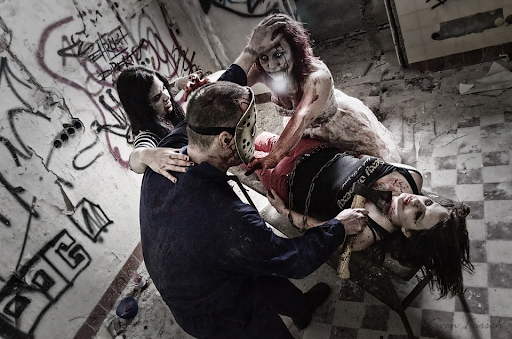
How Their Bodies React to Painful Stimuli
Zombies, often exhibit resilience to pain, enduring severe injuries without apparent distress. However, a closer examination of their anatomy reveals fascinating insights into their unique responses to painful stimuli.
Zombie bodies undergo significant changes compared to living organisms. Decay and necrosis affect their physical structure, deteriorating vital organs, muscle tissue, and nerve pathways. As a result, the transmission of pain signals within their bodies is disrupted, impairing their ability to perceive pain in the same manner as living beings.
One notable aspect is the degradation of their nervous system. While basic reflexes may remain intact, the intricate neural network responsible for pain processing and interpretation is compromised. The decayed and damaged nerves fail to efficiently transmit pain-related sensory information, resulting in a diminished perception of discomfort. Consequently, zombies may not experience pain as acutely or immediately as humans do.
Additionally, the altered physiology of zombies affects their biochemical responses to pain. In living beings, the experience of pain triggers the release of various neurotransmitters and hormones that modulate the perception of discomfort. However, in zombies, these biochemical processes are disrupted and dysregulated.
Consequently, the release of pain-dampening substances, such as endorphins, is significantly diminished or absent. This lack of natural painkillers contributes to their apparent indifference to painful stimuli, as they do not benefit from the body’s self-regulating mechanisms that mitigate the sensation of pain.
Moreover, their bodies decay and necrosis also affect their sensory systems’ integrity. Zombies often exhibit compromised vision, hearing, and tactile perception due to the deterioration of sensory organs and neural connections. This further diminishes their ability to register and interpret painful stimuli accurately. Their sensory Impairment, combined with the disrupted pain pathways, results in a blunted and distorted experience of pain, if any.
It is essential to acknowledge that the depiction of zombie anatomy varies across different fictional universes. Some stories may present zombies with heightened pain sensitivity, making them more susceptible to agony. However, from a scientific standpoint, the notion of zombies enduring pain without significant distress aligns with the physical changes their bodies undergo.
Understanding the unique reactions of zombie bodies to painful stimuli adds depth to their portrayal in works of fiction and raises intriguing questions about the boundaries of human experience. It prompts us to contemplate the intricate interplay between the physical body, the nervous system, and pain perception. By exploring the anatomy of zombies, we gain insights into the fascinating and unsettling realm of these undead beings, further fueling our fascination with their existence.
In conclusion
the concept of pain in zombies is a multifaceted and intriguing topic. While fictional portrayals often depict zombies as impervious to pain, the scientific perspective suggests that their pain experience is greatly diminished due to their deteriorated anatomy, compromised neural pathways, and dysregulated physiological responses. The limited capacity for pain perception in zombies adds to their enigmatic nature, fueling our fascination with these undead creatures. Whether exploring the emotional side, the ethics of killing, or the anatomical reactions to pain, delving into the world of zombies provides us with thought-provoking insights into the boundaries of human experience and the complexities of the undead realm.
